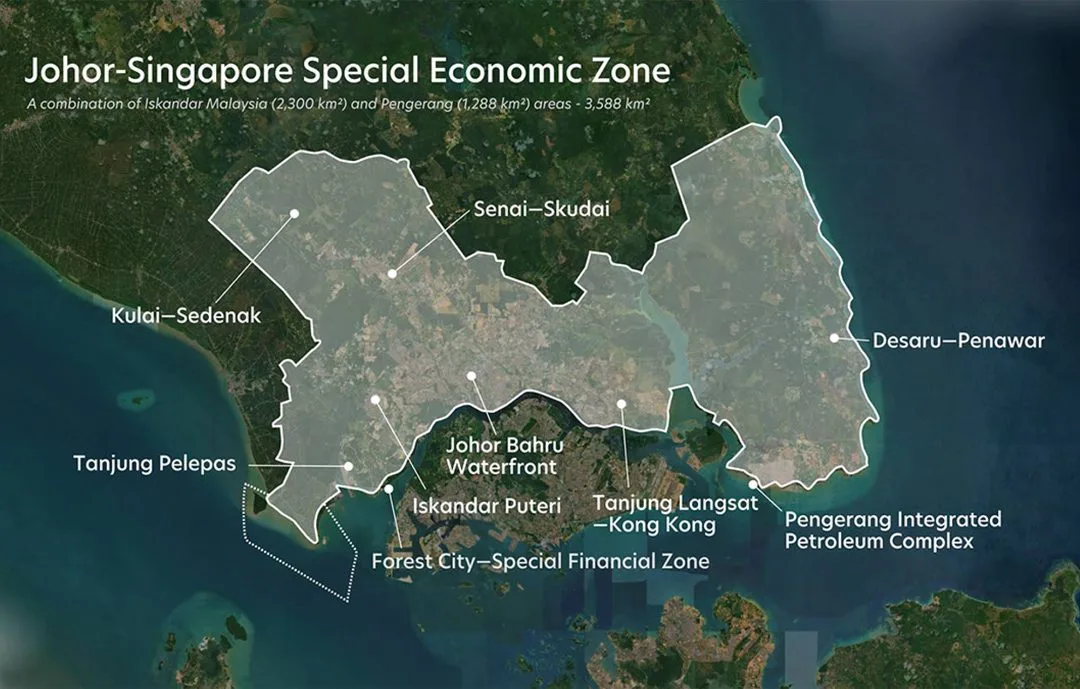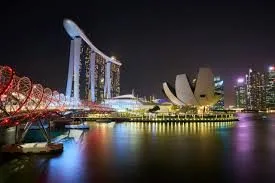Singapore vs Malaysia: Which Country Is Best to Start a Business In?
A comparison of Singapore and Malaysia’s business environments — highlighting setup speed, tax incentives, and regional integration through the Johor–Singapore SEZ.

Expanding your business into Southeast Asia can be both exciting and challenging. For many entrepreneurs, Singapore and Malaysia emerge as the top two contenders — each offering unique opportunities depending on your goals, budget, and operational strategy. This article breaks down the key factors to help you decide where to start, based on data, regulations, and practical considerations.

Why Businesses Choose Singapore and Malaysia
Singapore: Asia’s Gateway Hub
Singapore is renowned for its transparency, efficiency, and international connectivity. It’s consistently ranked among the easiest places in the world to do business — and for good reason:
- 100% foreign ownership permitted.
- Low corporate tax rate (17%) and strong double-tax treaties.
- Political stability and robust legal system.
- World-class banking and logistics infrastructure.
- Highly skilled, English-speaking workforce.
Malaysia: A Cost-Efficient Powerhouse Next Door
Malaysia complements Singapore as a larger, cost-effective market with a growing middle class and diverse consumer base. Here’s why it’s an attractive destination for expansion:
- Lower startup and operating costs.
- Bilingual talent pool (English, Malay, Mandarin).
- Rapidly expanding e-commerce market (Shopee, Lazada, TikTok Shop).
- Strategic location with strong manufacturing and logistics infrastructure.
- Government incentives for foreign investment and digital transformation.
Models | Singapore | Malaysia |
|---|---|---|
Ease of Doing Business | Highly efficient and digital | Improving; still bureaucratic in some processes |
Setup Speed | 1–2 days via ACRA BizFile | 5–10 days via SSM |
Corporate Tax Rate | 17% | 24% (17% for SMEs) |
Foreign Ownership | 100% allowed | 100% allowed (in most sectors) |
Resident Director | At least one local resident (Citizen/PR/Pass holder) | At least one ordinarily resident director |
Talent Cost | High | Moderate |
Market Size | 5.6 million | 33 million |
E-commerce Maturity | Advanced | Rapidly expanding |
Primary Strength | Finance, global HQ setup | Cost-effective operations, consumer market |
Setting Up a Company: Key Requirements
In Singapore
- Register with Accounting and Corporate Regulatory Authority (ACRA).
- Minimum one local director and one shareholder.
- Setup typically completed within 1–2 working days.
- Annual Return filing with ACRA within 7 months of the financial year end.
- Audit exemption if you meet two out of three criteria: revenue ≤ S$10m, assets ≤ S$10m, ≤50 employees.
In Malaysia
- Register with the Companies Commission of Malaysia (SSM).
- Minimum one resident director and one shareholder.
- Setup usually takes 5–10 working days.
- Annual Return and audited financial statements must be submitted to SSM.
- Limited audit exemptions apply (e.g., dormant or very small companies).
Taxation & Indirect Taxes
Singapore
- Corporate tax: 17% flat rate.
- No capital gains tax.
- GST at 9% as of 2025.
- Numerous tax incentives and startup exemptions (e.g., Startup Tax Exemption: 75% off first SGD 100k profit).
Malaysia
- Corporate tax: 24% standard, 17% for SMEs.
- No capital gains tax on most assets.
- SST (Sales and Service Tax) applies: 10% sales tax, 6% service tax.
- Effective July 2025, SST scope expands with higher rates on selected categories.
Banking and KYC
Singapore
- Straightforward corporate banking with major banks (DBS, UOB, OCBC).
- Digital onboarding available for many startups.
- Required documents: BizFile registration, board resolution, and director/UBO identification.
Malaysia
- Major banks: Maybank, CIMB, RHB.
- In-person verification commonly required.
- Foreigners often need proof of local operations or partnership for account approval.
Employment and Visas
Singapore
Foreign professionals can apply for an Employment Pass (EP) or EntrePass, depending on their role or business structure. A local resident director (Citizen, PR, or valid pass holder) is still required.
Malaysia
Foreigners can obtain work permits tied to company structure and ownership. A resident director is required, and in certain sectors, additional regulatory approvals may apply.
Incentives and Support Programs
Country | Program | Benefit |
|---|---|---|
Singapore | Startup Tax Exemption (SUTE) | 75% tax exemption on first SGD 100,000 of profit |
Malaysia | Pioneer Status & Investment Tax Allowance | 70%–100% tax exemption for 5–10 years in promoted sectors |
Governments in both countries also support digitalization, automation, and R&D through co-funding programs and innovation grants.

The Johor–Singapore Special Economic Zone (JS-SEZ)
Announced in early 2024, the Johor–Singapore Special Economic Zone (JS-SEZ) represents a landmark collaboration designed to deepen economic ties between both nations. Located across the Causeway, this initiative will streamline cross-border business operations and attract regional investment.
Key Highlights of JS-SEZ:
- Simplified customs and logistics: Expected to ease goods and workforce movement between Johor and Singapore.
- Integrated investment ecosystem: Singapore’s financial hub advantages combined with Johor’s land, talent, and cost benefits.
- Joint innovation corridor: Targeted industries include electronics, logistics, renewable energy, digital economy, and healthcare.
- Business synergy: Allows companies to base their headquarters or R&D in Singapore while managing manufacturing or fulfillment in Johor.
For regional businesses, the JS-SEZ strengthens both markets’ complementary roles — positioning Singapore as the strategic gateway and Malaysia (Johor) as the regional growth engine. This integrated model enhances Southeast Asia’s competitiveness for trade, logistics, and innovation.
Compliance and Audit Snapshot
Singapore (ACRA):
- Annual Return within 7 months of FYE.
- Audit exemption for qualifying small companies.
Malaysia (SSM):
- Annual Return and audited financials mandatory for most Sdn. Bhd. companies.
- Limited exemptions for dormant or micro-sized entities.

Final Thoughts
Both Singapore and Malaysia present compelling advantages. Singapore is best suited for companies prioritizing international connectivity, financial credibility, and regulatory transparency. Malaysia offers strong growth potential with a lower cost base and access to a larger consumer market.
The Johor–Singapore SEZ adds a new layer of opportunity — bridging both ecosystems into one cohesive regional hub. Businesses that strategically position across both sides stand to gain the best of Southeast Asia’s stability, efficiency, and scalability.
Frequently Asked Questions (FAQ)
1. Which country is faster to incorporate — Singapore or Malaysia?
Singapore typically takes 1–2 working days to incorporate via ACRA’s BizFile system. In comparison, Malaysia registration through SSM usually takes around 5–10 working days, depending on document preparation and approval time.
2. Can a foreigner own 100% of a company in Singapore or Malaysia?
Yes. Both countries allow full foreign ownership in most sectors. However, each requires at least one resident director — a Singapore Citizen, PR, or valid pass holder in Singapore, and an ordinarily resident director in Malaysia.
3. What are the main taxes to consider when operating in these countries?
Singapore levies a 17% corporate tax and 9% GST (as of 2025). Malaysia has a 24% corporate tax (17% for SMEs) and applies SST — 10% sales tax and 6% service tax, with expansions effective July 2025.
4. How does the Johor–Singapore Special Economic Zone (JS-SEZ) benefit businesses?
The JS-SEZ is designed to create a high-efficiency economic corridor that integrates Singapore’s capital access, governance standards, and innovation ecosystem with Johor’s cost-effective land, workforce, and industrial capacity. Businesses can enjoy faster customs clearance, synchronized logistics systems, and shared talent mobility policies that reduce operational friction. For manufacturers, logistics providers, and digital economy firms, this zone opens a unique opportunity to structure operations across borders — anchoring strategy and finance in Singapore while expanding production and fulfillment capabilities in Johor for greater scalability and regional competitiveness.
Have random questions?
Sellercraft offers market entry services designed to help global brands launch and scale their business in Malaysia efficiently.